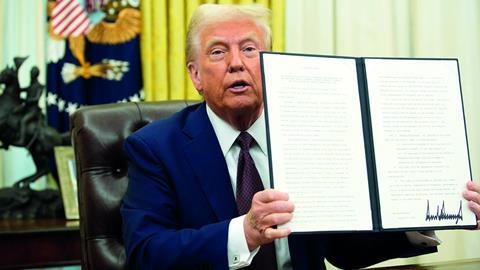Trump’s Expedited Deportations Blocked: What This Means for Immigrants’ Rights
A U.S. federal judge recently ruled that the Trump administration’s summary deportation of Venezuelan migrants accused of gang affiliations is likely unconstitutional. This decision highlights the importance of protecting individuals’ rights to due process, even in cases involving national security concerns.
The Controversial Deportations
In early March 2025, President Trump authorized the deportation of nearly 260 individuals linked to the Tren de Aragua, a notorious Venezuelan criminal gang. The administration invoked the Alien Enemies Act, which allows the president to deport individuals who pose a national security threat. However, critics argued that the speed of these deportations bypassed essential legal steps, preventing the migrants from having a chance to defend themselves in court.
Judge Boasberg’s Ruling
![]()
U.S. District Judge James Boasberg intervened, blocking the deportations and questioning their legality. In his ruling, Judge Boasberg stressed that even individuals accused of serious crimes have the right to a fair hearing before being removed from the country. He expressed concern that the Trump administration’s swift action seemed designed to avoid judicial scrutiny, especially given that some of those deported had no criminal records.
Boasberg’s ruling was a temporary measure, but it sent a strong message about the importance of due process for all individuals, regardless of their immigration status or alleged criminal ties.
Appeals Court Weighs In
Following Judge Boasberg’s decision, a federal appeals court backed the temporary block on deportations. The court’s judges pointed out that national security concerns cannot override the fundamental rights guaranteed by the Constitution. One of the judges, Patricia Millett, drew comparisons to the treatment of Nazi war criminals, emphasizing that those deported had been denied even the basic legal procedures given to those accused of war crimes.
The Government’s Response
The Trump administration expressed frustration with the court’s intervention, arguing that the rapid deportations were necessary to protect national security. Officials claimed that those deported posed a significant threat, and swift action was crucial. However, the courts stood firm, maintaining that constitutional protections should never be compromised in the name of security.
What’s Next for Deportation Policies?
This ruling raises important questions about the balance between protecting national security and respecting individuals’ rights. The decision has sparked an ongoing debate about how the U.S. should handle immigration enforcement, especially when it involves people accused of criminal activity. As the legal process continues, it’s clear that the courts will remain an important check on executive power when it comes to deportations and due process.



Comments are closed, but trackbacks and pingbacks are open.